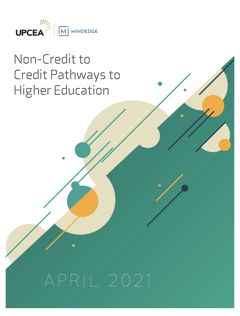NON-CREDIT TO CREDIT PATHWAYS TO HIGHER EDUCATION: UPCEA MEMBER SURVEY RESULTS
Sponsored by MindEdge Learning
Academic institutions are recognizing the value in nontraditional pathways that bring big benefits to adult learners, working to grow efforts beyond the pilot stage.
North American colleges and universities are beginning to recognize the value of non-credit to credit pathways. But most of these institutions have yet to implement these nontraditional avenues to a college degree.
Non-credit to credit pathways translate non-credit achievements -- such as professional certifications or licenses, prior learning assessments, faculty reviews, and military service -- into credit toward a degree. With college enrollments dropping, along with public confidence in the value of a college education, non-credit to credit pathways allow students the flexibility to keep their education options open to match their lifestyle.
Implementing non-credit to credit pathways can provide great value to learners and institutions alike. But the institutional barriers to deploying these pathways are still high, and institutions have work to do to provide this new opportunity for learners.
Download the UPCEA research report below to find out more about the state of non-credit to credit pathway implementation.
The University Professional and Continuing Education Association (UPCEA), in conjunction with its Center for Research and Strategy, and MindEdge Inc., a leader in innovative online courseware, have continued collective efforts to develop additional research on modern educational pathways for adult learners.
The survey was designed by Dr. Gail Ruhland (St. Cloud State University), Dr. Linda Wilson (CSU Dominguez Hills), and Dr. Sandra von Doetinchem (University of Hawaii at Manoa), in collaboration with Jim Fong and Bruce Etter from UPCEA.
MindEdge is a proud UPCEA corporate partner and helped to underwrite this research. For more on MindEdge, please visit: https://www.mindedge.com/continuing-education/
To read the press release, click here.


